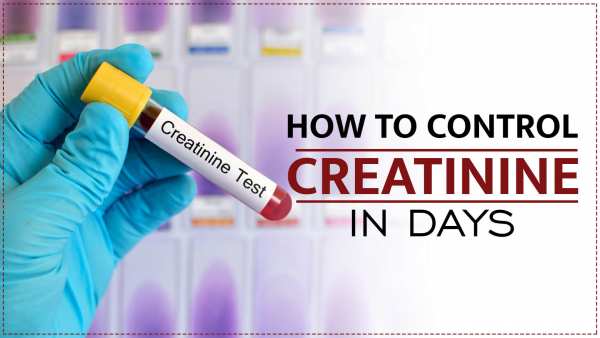Ayurvedic Kidney Treatment – Control Creatinine in Days
Creatinine is a typical waste that our kidney releases during the blood filtration process. This chemical substance is a by-product of normal muscle function. This often means that the more muscle mass you have, the more creatinine the body is expected to produce.
Levels of creatinine in the blood also reflect on muscle mass and kidney function.
When your kidney function is not accurate, you can expect a slight variation in its work. This means waste instead of releasing out sums up in the blood itself. This employs to creatinine as well.
So, doctors rely on the measurement of creatinine as a parameter to know how its function is. Men and women with more muscle can be expected to have little variation otherwise.
Normally, in men, the range stays between 0.6 to 1.2 mg/dL, while in the case of women, it should be between 0.5 to 1.1 mg/dL. Women have fewer muscles than men, and so do the variation.
Temporarily, differences in creatinine levels can be witnessed due to changes in body size, activity level, diet, and medications you are consuming.
But if your creatinine levels have been on a surge for a long time, check with your doctor. Perhaps, you might need Ayurvedic kidney treatment in India.
There are usual ways to treat elevated levels of creatinine, including medicines, dialysis, and transplant in some cases. Ayurveda is yet another way to Control Creatinine in Days. Ayurvedic reforms are easy and efficient as they begin to work at the cellular level.
How can you know about increased levels of creatinine?
As creatinine is a waste product, you may expect some of the complications brought in by the rise in waste levels. This waste-filled blood reaches the heart and other subsiding organs and likely affect their functioning.
As kidney disease progresses, you may experience a few signs, including:
- Swelling in the lower extremities or around the face and eyes.
- Fatigue or feeling tired for no reason.
- Changes in how often you urinate.
- Changes in urination including blood in the urine, smelly urine, and urine dribbling.
- Loss of appetite.
- Nausea and vomiting
- Itching.
- Breathlessness.
- Chest pain.
- Headache.
- Chills and fever.
Some of these signs may often coincide with other health conditions. Consult your doctor to rule out the exact cause of high creatinine and begin your Ayurvedic kidney treatment based on that.
Ways to subside creatinine levels
Here are some generalized measures you can adopt to control your creatinine in days.
Diet tips
Dietary aspects related to high levels of creatinine may include:
Reducing protein intake
Consuming red meat, which is cooked on high flame, often increase the level of creatinine. Red meat is muscle tissue, which comes with creatine naturally, and if you cook it, it may break down into creatinine.
If your creatinine is already high, consuming a little will even result in a high creatinine range.
Instead, you can consume vegetable sources of proteins such as beans, etc.
Lower your salt intake
Using too much salt can contribute to high blood pressure. Processed foods, for instance, are loaded with sodium and phosphorus, which may potentially raise your risk of kidney disease.
Consider using fewer spices and salt in your diet and try to cook your food at home with your wish of spices and salt.
Avoid dehydration
Creatinine levels can rise when you are not drinking enough water already. Signs may include fatigue, dizziness, and thirst. Extreme dehydration may affect your kidneys and heart. It can result in acute kidney failure also. If you don’t like to drink plain water, try mixing it with other substances to add taste. You can also take herbal tea after consulting with your dietician. Kidney patients often have to endure several restrictions on their dietary parts. So their decision to include anything in the diet should be addressed by a dietician only.
Increasing dietary fiber intake
Dietary fiber can provide your body with enormous benefits, such as helping flush waste out, including creatinine. A source of study gas revealed the relevance of dietary in people with chronic kidney disease.
Some good sources of fiber that may help include fruits, vegetables, whole grains, seeds, etc.
Supplement and medication use
Supplements, many of them, come up with the ability to increase creatinine levels. Many athletes and bodybuilders take supplements that help them build muscle and endurance. The muscles have to use creatine for energy generation, but if the muscles are not able to, the body converts it into creatinine for elimination.
As a result, you may have more creatinine in the blood and lab technicians may misinterpret it as kidney disease. So, if you are a kidney patient already, make sure that you do not consume supplements that can further raise creatinine.
Avoid using too many painkillers
Over the counter painkillers like non-steroidal anti-inflammatory drugs can be harmful if you consume them in many or too often over the recommended choice. Consult your doctor for the right dosage.
Avoid smoking
Smoking cigarettes can harm your body in numerous ways, including raising your risk of kidney disease. If not now, but somewhere in the time being, it may affect your kidneys and increase creatinine levels.
Limit your alcohol intake
Alcohol consumption can pose a threat to your kidneys to a significant level. When you consume alcohol, the waste is expected to be released out by the kidneys only. This burdens your already ill kidney and abruptly leads to loss of kidney function. If you have high blood pressure or diabetes, your risk of developing kidney disease is already rich.
Lifestyle tips
People who work out strenuously are at an increased risk of kidney disease. Check with your doctor about whether your exercise routine is safe or not. We know regular exercise is always helpful, but doing them intensely and consistently may result in a temporary surge in creatinine levels, as indicated by many studies.
Ayurvedic kidney treatment
Ayurveda is an ancient remedial science that was put to use 5,000 years ago. This science has been used to treat a broad spectrum of conditions, including cancers of certain types. Ayurvedic evaluation of any disease is based on considering the Doshas and Gunas before assuming your body type and the illness you are experiencing. This makes the treatment a little easy and efficient at the same time. The relevance of Ayurveda is based on its ability to catch the underlying cause of the disease. The main focus is on improving the signs, treating the cause, improving body function, and strengthening the immune system. When your mind and body are in proper harmony, you can expect longevity as most of the diseases or conditions get healed on their own.
This is far most the major reason why Ayurveda is considered the best addressal to health issues.
The bottom line
Excessive creatinine levels may indicate serious health issues but also points out temporary causes such as lifestyle changes that may disrupt your kidney function.
If your healthcare provider rules out any temporary reason for high creatinine range, he may suggest dietary and lifestyle adjustments to cope with this. In serious cases, he may also suggest ayurvedic kidney treatment to control creatinine in days.
Author’s bio:
Hi, my name is Bhannu, writer and editor by profession. This article has been drafted keeping in mind the needs of the readers and audience and backed by Ayurvedic Experts. The information shared above is authentic and curated in reference to the best healthcare knowledge.


